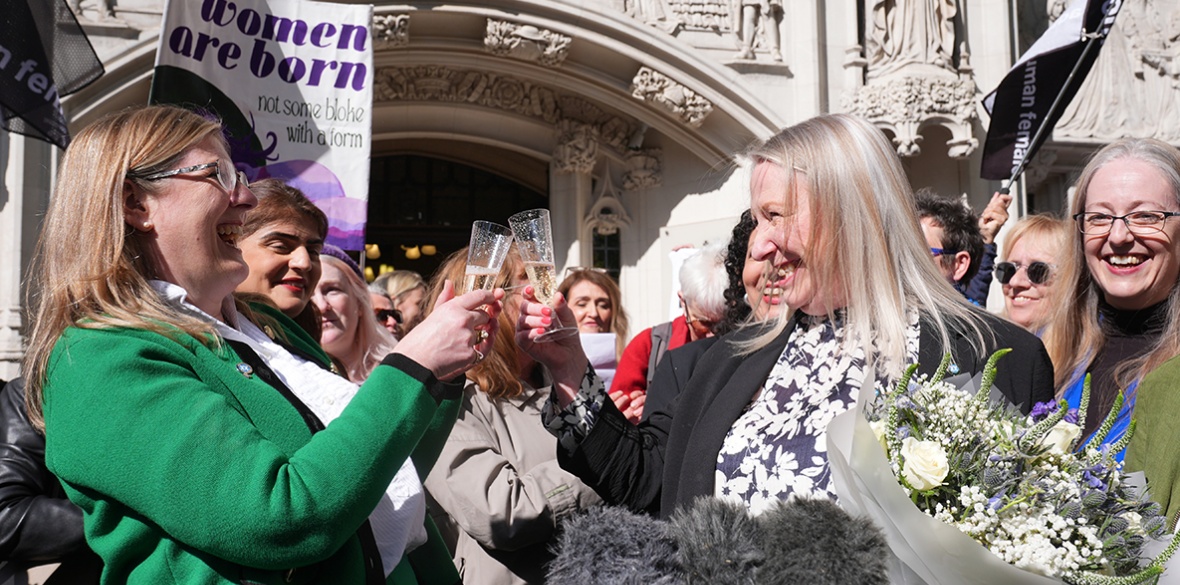This is the last article you can read this month
You can read more article this month
You can read more articles this month
Sorry your limit is up for this month
Reset on:
Please help support the Morning Star by subscribing here
THE term “woman” in the Equality Act refers to biological sex and those with a gender recognition certificate can be refused entry to same-sex spaces if proportionate, according to Britain’s highest court.
The landmark 88-page Supreme Court judgment was prompted by the then SNP-Green Scottish government’s 2022 Gender Recognition Act, passed with the stated intention of relaxing the process to obtain a gender recognition certificate (GRC), the key to changing legally assigned gender.
That was struck down by the British government, which argued it would impact the operation of the 2010 Equality Act.
The For Women Scotland (FWS) campaign then launched a series of legal challenges to define women in law, arguing biological sex had primacy in dictating entry to single-sex spaces, such as those created for women fleeing male violence, under the Equality Act.
Unanimously agreeing, Supreme Court justices ruled: “Read fairly and in context, the provisions relating to single-sex services can only be interpreted by reference to biological sex.
“The intention must have been to allow for the exclusion of those with the protected characteristic of gender reassignment, regardless of the possession of a GRC, in order to maintain the provision of single or separate services for women and men as distinct groups in appropriate circumstances.”
In a statement welcoming the judgement, FWS said: “The Supreme Court has confirmed what women across the country already knew. Sex matters.
“The court has recognised that women’s rights must be based on biological sex, not self-declared identity.
“This ruling restores legal clarity and reaffirms the purpose of the protections written into the Equality Act.
“This win protects all women, including trans-identifying females, by ensuring maternity rights, women-only spaces, and female-focused services are grounded in reality.
“We thank the brave women who fought this case and the thousands who stood beside them.
“This is your victory. But the fight isn’t over. We will keep pushing until sex-based rights are not only protected – but respected.”
Labour Women’s Declaration welcomed the ruling, saying: “The government now needs to instruct all government departments to bring their policies, training and guidance into line with the judgment.
“The ‘clarity and confidence’ the ruling brings must also be applied to all positive action initiatives and associations for women within the Labour Party, such as women’s branches and committees.”
Posting on X (formerly Twitter), SNP First Minister John Swinney said his government accepted the ruling and “will now engage on the implications.”
But Scottish Green MSP Maggie Chapman said: “This is a deeply concerning ruling for human rights and a huge blow to some of the most marginalised people in our society.
“It could remove important protections and will leave many trans people and their loved ones deeply anxious and worried.”
Amnesty International UK chief executive Sacha Deshmukh said: “It is important to stress that the court has been clear that trans people are protected under the Equality Act against discrimination and harassment.
“Amnesty intervened in this case to remind the court that legal gender recognition is essential for trans people to enjoy the full spectrum of rights each of us is entitled to, including safety, health and family life.
“The Supreme Court itself today made clear that the vilification of a marginalised minority group is absolutely wrong.
“All public authorities in the UK need to unequivocally enforce protections for trans people against discrimination and harassment.”
A UK government spokesman said: “This ruling brings clarity and confidence, for women and service providers such as hospitals, refuges, and sports clubs.
“Single-sex spaces are protected in law and will always be protected by this government.”










